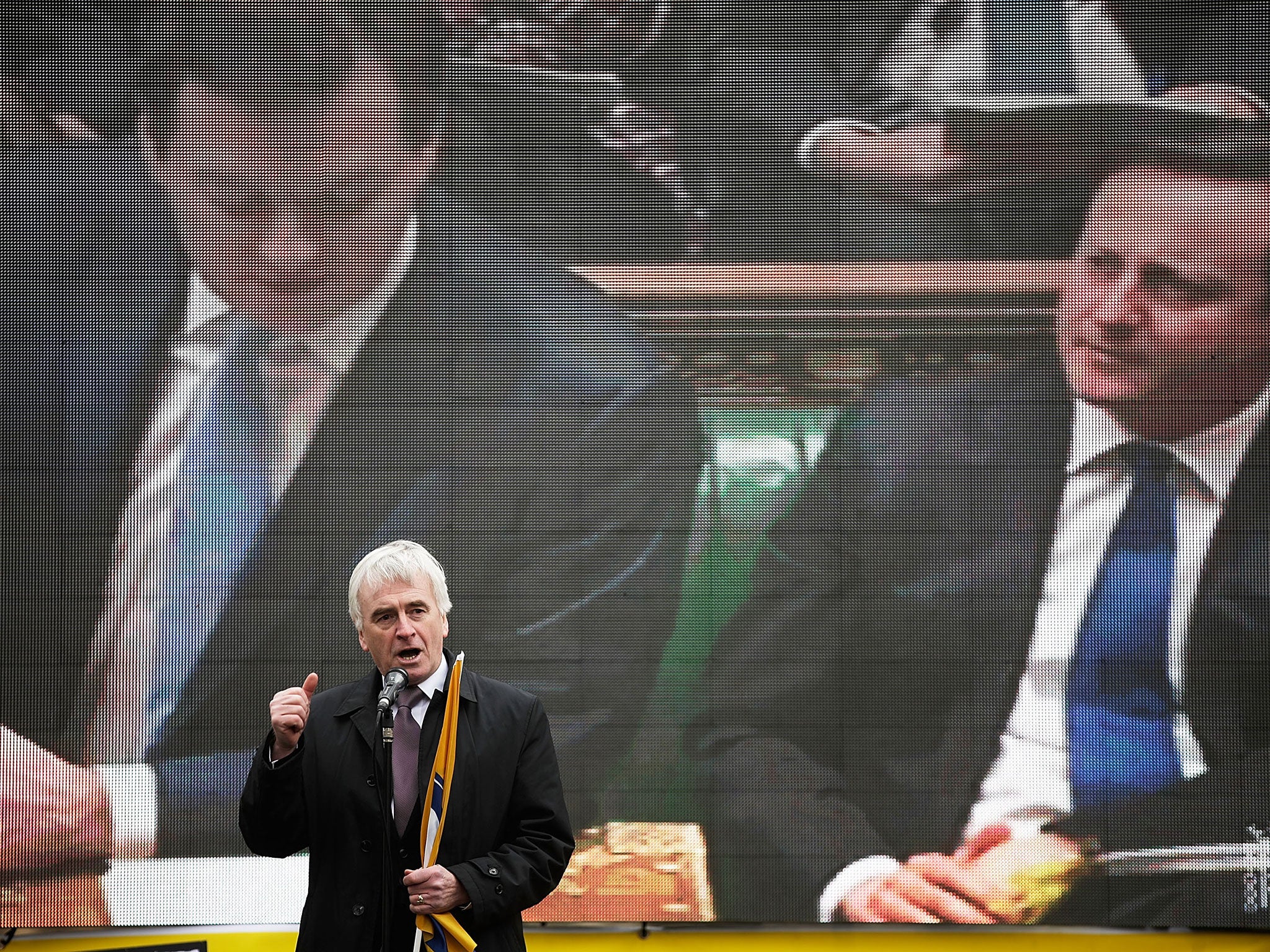Labour bids to win back economic credibility as John McDonnell vows to balance Budget over five years
Exclusive: 'Sound finances are the foundations on which everything else is possible'

Labour is set to outline a fresh set of fiscal rules in a bid to restore the party’s battered economic credibility – while still emphasising that a future government led by Jeremy Corbyn would invest considerably more in infrastructure than George Osborne.
The shadow Chancellor, John McDonnell, will admit that Labour lost the public’s economic trust during the 2008 financial crisis and will set out the main parameters of the party’s new “fiscal credibility rule”.
“Sound finances are the foundations on which everything else is possible,” he is due to say in a speech at the Royal Society of Arts in London. “Regaining the public’s trust with the public finances must happen before the electorate will consider trusting Labour with the keys to government again”.
“There is no short cut to regaining fiscal credibility with the electorate. We have a long way to go before we can regain the trust that was lost after the global financial crisis of 2008, which happened on Labour’s watch. There is no silver bullet.”
One of the main conclusions of an official party report by Margaret Beckett into Labour’s severe defeat in last year’s general election found that Labour, led by Ed Miliband, failed to shake off the view that the last Labour government was responsible for crashing the economy.
A separate inquiry, led by the Labour MP John Cruddas, was even more specific, concluding that Labour lost because it was regarded by the electorate as “anti-austerity”.
The main elements of the new fiscal rules, which are understood to have emerged from discussions in Labour’s seven-person Economic Advisory Council, will be to achieve a balance on the current budget over a rolling five year forecast and to see the national debt fall as a share of trend GDP over the span of a Parliament.
The independent Office for Budget Responsibility (OBR) would, as now, be in charge of judging whether these targets were on course to be met.
A key distinction with the Chancellor’s existing “fiscal mandate” is that the deficit target would not include capital spending, meaning a Labour government could meet its rules while still spending liberally on infrastructure.
The Coalition government was criticised by independent economists for slashing state capital expenditure on roads, rail and buildings in the years after 2010 despite the fact that these investments increase the overall potential of the economy in the long term.
Economic organisations such as the IMF and the OECD are now calling on nations with “fiscal space”, which includes Britain, to step up capital expenditure to support flagging global growth.
Another critical distinction between Labour’s plan and the Chancellor’s rules lies in the economic conditions under which Labour’s fiscal restraints would be relaxed. The Chancellor’s Charter for Budget Responsibility – passed into law last year– requires the Government to target an overall budget surplus by 2019-20, and every year subsequently, unless growth falls below 1 per cent.
But Labour’s new rules would be suspended if the Bank of England’s Monetary Policy Committee judged it could not reduce its policy interest rate any further to stimulate growth.
This would have meant that Labour would not have been bound by the need to cut back state spending after 2010 when GDP growth was above 1 per cent but the Bank’s interest rates were still nailed to the floor.
The OBR estimates that austerity in 2011 and 2012 knocked 1 per cent off GDP growth in both years. But some economists think the OBR is underestimating the size of the “fiscal multipliers”, implying the Chancellor’s cuts had a larger negative effect.
A poll of 33 eminent economists by the Centre for Macroeconomics last year found that two-thirds disagreed with the proposition that the Coalition’s post-2010 policies had a positive economic effect.
More recently, the Institute for Fiscal Studies criticised the design of Mr Osborne’s fiscal mandate, saying that it was “very inflexible”.
Last October, Labour tied itself up in knots on the question of whether or not to back Mr Osborne’s new fiscal charter in the Commons. Mr McDonnell initially said he would back the charter before reversing his position.
City of London analysts have concluded the most vulnerable element of the rules is likely to be the requirement that the national debt must fall as a share of GDP every year.
The unexpected weakness of inflation means that the economy, in cash terms, has not grown by as much as the Chancellor expected last year, putting this target in jeopardy without more near-term spending cuts.
The committee: McDonnell's advisers
The advisory committee, formed last September, meets quarterly to “discuss and develop ideas around the official economic strategy” of the party. Its members include world-renowned economic stars such as best-selling French scholar Thomas Piketty and Nobel laureate Joseph Stiglitz. Other members are Mariana Mazzucato of Sussex University, highly respected for her work on the state’s role in facilitating technological advances; the labour market expert David Blanchflower; Ann Pettifor of Prime Economics; Simon Wren-Lewis of Oxford University and Anastasia Nesvetailova of City University London. This is their first substantive contribution to Labour policy.
Subscribe to Independent Premium to bookmark this article
Want to bookmark your favourite articles and stories to read or reference later? Start your Independent Premium subscription today.

Join our commenting forum
Join thought-provoking conversations, follow other Independent readers and see their replies